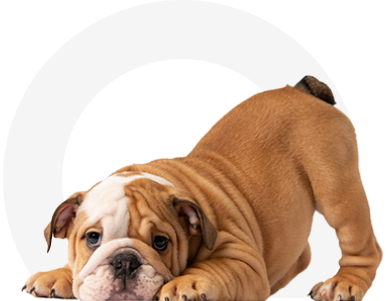Head Tremors in Bulldogs and French Bulldogs
Dear Dr. Kraemer, I’m writing with deep concern about my English Bulldog, Zoey. Today, I noticed she was experiencing unusual head tremors—shaking and bobbing. It’s quite distressing to witness. She has no history of seizures or epilepsy. I’ve read about various possible causes, but I’m unsure if this is an emergency. Should I rush Zoey to the emergency room, or is there something I can do at home for now? I watched a video on vet4bulldog that looks like what Zoey has. You described that condition as “idiopathic bulldog head tremors.” Is that what it is?
Sincerely Sara #FrenchieHealth #DogEmergency #HeadTremors 🐾
Head tremors in bulldogs and French bulldogs are also known as:
- “Bulldog head bobbing”,
- “Bulldog head shaking”
- “Bulldog head nodding”
- “Idiopathic bulldog head tremors“
Bulldog and French Bulldog head tremors, head shaking, and head bobbing are interchangeable terms
Bulldog Head Tremors 5 X MUST KNOW
- The most common origin of bulldog head tremors is unknown (idiopathic).
- The condition is unique to bulldog breeds and is usually painless and harmless.
- Medication is usually not required, and idiopathic tremors are not considered seizures
- They can be halted by diverting attention, such as to food or a toy.
- For your bulldog’s neuro health, we offer Dr. Kraemer’s Bulldog Head Tremors Bundle
Members of this bulldog community prefer prevention over RX
Head Tremors in Bulldogs and French Bulldogs: CAUSE
The precise cause of head tremors in bulldogs remains elusive. Despite thorough research, we have not identified a definitive reason for these seemingly spontaneous head-bobbing motions. However, several factors may contribute.
- “Idiopathic”: idiopathic means “cause unknown.”
- “Focal seizures”
- “Intentions tremors”
- “Sleep disorder”
- Neurological imbalances: Some theories suggest potential imbalances in specific neurotransmitters might be involved.
- Genetics: A genetic link seems likely, considering the higher prevalence of head tremors in bulldogs compared to other breeds.
- Structural differences: the brain region responsible for coordination and balance might play a role.
The most common type of bulldog and French bulldog head tremors is IDIOPATHIC
Bulldog Head Tremor IDIOPATHIC ORIGEN:
The origin of this bulldog head nodding and bobbing is mostly unknown (idiopathic) and thus is considered “benign.” It’s the most common reason for this strange and, at times, scary condition.
It can be mild, subtle, and brief in some cases, and more dramatic in others.
Bulldog Head Nodding Due To A FOCAL SEIZURE:
In some bulldog head tremor cases, a focal seizure or a stretch mechanism localized to the head could be the underlying cause.
Bulldog focal seizures could imitate the more common bulldog idiopathic head shaking (“bulldog head bobbing, bulldog head nodding, bulldog head tremors).
Bulldog Head Tremor: Idiopathic vs Focal Seizure SIMILARITIES
- MOVEMENT: Both conditions can manifest as head shaking, bobbing, or nodding movements.
- FREQUENCY & INTENSITY: Both can occur with varying frequencies and intensities.
- SPONTANEIOUS: Both can seem spontaneous and unpredictable to casual observers.
Bulldog Head Tremor: Idiopathic vs Focal Seizure DIFFERENCES
- AWARNESS: Your bulldog might seem disoriented or unresponsive during a seizure, while awareness appears undisturbed during idiopathic episodes.
- DROOL & TWITCH: Focal seizures might involve additional symptoms like twitching, drooling, or changes in posture or eye movement.
- TRIGGERS: Certain factors like excitement, stress, or loud noises can be triggers for focal seizures, which is not the case in idiopathic episodes
The area of the brain affected in bulldog focal seizure head tremors is the area that controls movement.
Bulldog Head Nodding INTENTION TREMORS:
The presentation of “bulldog intention tremors” can be very similar to the more common bulldog idiopathic head shaking.
Intentional tremors originate in the cerebellum, and you can often differentiate them from the idiopathic type by their jerkier shaking movement.
Idiopathic head shaking is generally considered harmless, while intentional tremors, if left untreated, can worsen and potentially impact daily activities.
PREVENT & TREAT: While idiopathic head shaking may not require specific treatment, intentional tremors often benefit from medications or other management strategies
Bulldog Head Shaking: Idiopathic Vs. Intention-Tremors SIMILARITIES
- Both can involve head-shaking, bobbing, or nodding movements.
- Both can occur sporadically or with varying frequency and intensity.
- Both can seem alarming to the pet owner at first glance.
Bulldog Head Shaking: Idiopathic vs. Intention-Tremors DIFFERENCES:
- ORIGEN: Intention tremors stem from the cerebellum, a brain region responsible for coordination and balance, while idiopathic tremors have multifactorial origin.
- MOVEMENT: They often appear jerkier and less rhythmic compared to the more “wave-like” head shaking of idiopathic cases. In addition, intentional tremors become more pronounced during intentional movements like
- eating
- drinking
- walking.
- TRIGGERS: While the idiopathic head shaking appears spontaneously, intentional voluntary actions typically trigger the intention tremors.
Bulldog intention tremors are typically jerkier and observed when your bulldog eats or drinks, or during other voluntary movements.
Bulldog and French Bulldog Head Bobbing Due To SLEEP DISORDER
Sleep Disorder Head tremors are usually present during the REM (rapid eye movement) sleep phase and are associated with active dreaming.
This disorder causes individuals to physically act out their dreams, sometimes with violent movements. In severe cases, head tremors or shaking could be seen as part of the dream enactment.

Head Tremors in Bulldogs and French Bulldogs PRESENTATION:
The presentation is often similar between those different head-bobbing disorders, so you should film them and make notes for your veterinarian or veterinary neurologist.
Bulldog and French Bulldog Idiopathic Head-Shaking PRESENTATION
Bulldog and French bulldog idiopathic head tremor patients remain alert and responsive.
Bulldog Focal Seizure Head Tremors PRESENTATION:
Bulldogs and French bulldogs suffering from focal seizures exhibit a change in mental status.
Bulldog Head Intention Tremors Head Nodding PRESENTATION:
Bulldog intention tremor presentation is similar to bulldog idiopathic head shaking, though the tremors are typically jerkier.
Bulldog and French Bulldogs Sleep Disorder Head Nodding PRESENTATION:
Bulldog sleep-disorder head tremors present during the dreaming phase (REM sleep).
Head Tremors in Bulldogs and French Bulldogs DURATION:
Most of the head shaking, tremors, nodding, and bobbing in bulldogs and French bulldogs are short-lived, but occasionally they could last for a few minutes.
Head Tremors in Bulldogs and French Bulldogs DIAGNOSIS:
Common diagnostic testing conducted for a bulldog head-shaking include:
- MEDICAL EXAM
- BILE ACID TEST: to help rule out portosystemic shunts (liver shunts).
- BLOOD TEST: a general blood test to check for diabetes and other medical conditions that can lead to seizures, including electrolytes and thyroid levels.
- IMAGING: CT and MRI
- OTHER: spinal fluid analysis, EEG
Head Tremors in Bulldogs and French Bulldogs PREVENT & TREAT:
Head tremors are typically intermittent and considered harmless, requiring no specific treatment.
Seizure medications are controversial and not necessary for idiopathic tremors.
It’s important to keep in mind that prescription medications always carry the potential for adverse side effects.
Head Tremors in Bulldogs: TRUTH & MYTH
In my practice and email communications with customers and bulldog owners, I often come across urban myths regarding bulldog head tremors.
The most inaccurate information tends to circulate on various online bulldog platforms. It’s crucial to always adhere to the “do no harm” rule.
There are instances when it’s better to take no action than to risk doing something potentially harmful.
Bulldog Head Saking SUGAR MYTH
Many owners swear by the erroneous syrup, honey, or ice cream head-shaking treatment; this is a myth.
The head tremors are neither caused by low blood sugar nor directly influenced by sugar intake.
Offering sugar won’t address the underlying cause and can even be detrimental in some cases, especially for diabetic dogs.
SUGAR WARNING: Excessive sugar intake can lead to various health problems like obesity, diabetes, and dental issues. Offering ice cream or sugary liquids regularly is unhealthy for any dog, regardless of the immediate goal.
When bulldog owners testify that the sugar trick works, they fail to understand that it was not the sugar but rather the neck movement and distraction. A toy or treat will achieve the same results.
Also, some breeders and online postings base their “sugar for bulldog head shaking” recommendation on the fact that sugar is given to depressed and shaking (seizure) hypoglycemic puppies or diabetic adults who were overdosed with insulin.
Bulldog head shaking has nothing to do with hypoglycemia, to stop idopathic bulldog head tremors, simply distract your bully with food, treat, or toy.
Bulldog Head Nodding CALCIUM SUPPLEMENT MYTH
Offering calcium supplements to a bulldog or French bulldog with a head shake has little merit. Like the sugar myth, even when testified by owners that “it works” the magic is not a direct cause and effect but rather incidental; the distraction and neck movement are the real cause and effect
Those are often given to female bulldogs suffering from “postpartum calcium deficiency” shaking and tremors (i.e., eclampsia).
Head Tremors in Bulldogs and French Bulldogs: TIPS & WARNINGS:
Below are selected tips and warnings, courtesy of Dr. Kraemer
Bulldog Head Tremors / HARMLESS TIP:
Don’t panic! Bulldog head shaking (bulldog head bobbing) is usually neither an emergency nor a life-threatening event.
It is considered idiopathic (arising from an unknown cause) and harmless.
Nevertheless, if you are not sure, please contact the local ER or your veterinarian.
Bulldog Head Tremors / DISTRACTION TIP:
Typically, I advise distressed bulldog owners to try and have their bully move his or her head and neck. A good example is distraction with a toy or a treat.
Distraction with food, toy, “lets go play or for a walk”, or by showing the leash, will usully stop your bulldog or French bulldog head tremors.
Bulldog Head Tremors / NON-PAINFUL TIP
Bulldogs and French bulldogs exhibiting head tremors and head bobbing are usually fully alert and otherwise acting normally.
As far as we know, bulldog and French bulldog idopathic head tremor is not a painful condition or a distress signal
Bulldog Head Tremors / OTHER DISEASE WARNING:
We do not know of any medical or neurological conditions that are a direct result of bulldog idiopathic head bobbing. Nevertheless, we advise that you take a video, make notes, and seek consultation from your local veterinary neurologist.
Bulldog Head Tremors / GENETIC LINK WARNING:
Because head shaking is predominantly observed in bulldogs, there is a suspicion of a genetic link. Consequently, we do not recommend breeding bulldogs with a history of head tremors to avoid potentially passing on this condition to future generations.
This cautious approach aims to contribute to the overall health and well-being of the breed.
Bulldog Head Tremors /SHAKING DIRECTION TIP:
Your bulldog puppy’s head shaking can present as an up-and-down movement (saying “yes”) or a side-to-side movement (saying “no”).
Bulldog Head Shaking / NEUROLOGICAL DISEASE:
Bulldogs with idiopathic head shaking are not likely to develop other neurological problems solely because of that condition.
The term “idiopathic” suggests that the cause of the head shaking is unknown or spontaneous, and in many cases, it is considered a standalone issue without progression to other neurological problems.
However, it’s crucial to monitor the dog’s health and behavior and consult with a veterinarian for a comprehensive assessment and appropriate guidance.
Bulldog Head Tremors TREATMENT:
There is no known treatment for idiopathic head bobbing in bulldogs and French bulldogs.
You can usually stop your bulldog or French bulldog’s idiopathic head from shaking by distracting him/her with food, a favorite treat or toy, a leash (“let’s go for a walk”), or having them tense their neck muscles, turning side to side.
Bulldog Head Tremors / LEG SHAKING:
Many senior bulldogs and French bulldog owners wonder why their aging dog’s hind legs are shaking.
Shaking of the extremities can happen when standing up or lying down and can be progressive.
Like head shaking in bulldogs, the origin of the senior bulldog leg shaking is likely idiopathic but as far as we know is not assoicated with the head shaking one
The theory is that “senior bulldog leg-shaking may be associated with
- disk disease
- neuropathy
- arthritis
- myelopathies
SENIOR BULLDOG LEG SHAKING
There is no known treatment for aging bulldog idiopathic leg shaking, but usually I will prescribe anti-inflammatory medication, or recommend bully therapeutic supplements like the
Bulldog Head Tremors DISTEMPER VIRUS WARNING:
Your bulldog might be head shaking or leg shaking due to other conditions; thus, you should always consult your veterinarian.
Head shaking due to advanced cases of distemper virus usually also involves the jaw and leg muscles and can be observed even while your bulldog is sleeping.
Distemper encephalomyelitis is rare because of the introduction of the vaccine and its integration to our canine pet’s wellness core vaccine series.
Bulldog Head Tremors POISONS & TOXINS WARNING:
Other types of tremors can be due to poisons and toxins, hormonal abnormalities, and electrolyte imbalance.
Bulldog Head Shake NEUROLOGICAL CONDITIONS WARNING
Other neurological disorders and conditions that can lead to head tremors are:
- Brain tumors
- Infections
- Ear infections: Inner ear infections can sometimes cause head shaking and tilting, while leg shaking might be less common.
- Pain: Pain from other conditions like arthritis or dental problems can also lead to shaking or trembling.
Welcome to our “Prevention Over RX” Bulldog Community
*This guide was compiled courtesy of Dr. Kraemer and is a “must-read” manual for any current or future bully owner
The information provided on this platform is for general informational purposes only. It is not intended as a substitute for professional medical advice, diagnosis, or treatment. Always seek the advice of your veterinarian regarding any medical condition. If you have or suspect you have a medical problem, promptly contact your pet’s healthcare provider. Never disregard professional medical advice or delay in seeking it because of something you have read on this platform. Reliance on any information provided here is solely at your own risk.









